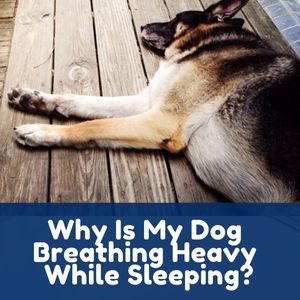Last updated on June 17th, 2022 at 11:29 am
Why Is My Dog Breathing Heavy While Sleeping? Should I be worried?
Table of Contents
There are a number of reasons why your dog may be breathing heavily (or breathing abnormally fast) while sleeping. In most cases, it’s nothing to worry about, but it’s always best to check with your veterinarian to rule out any underlying health issues. Here are a few common reasons your dog breathes fast while sleeping.
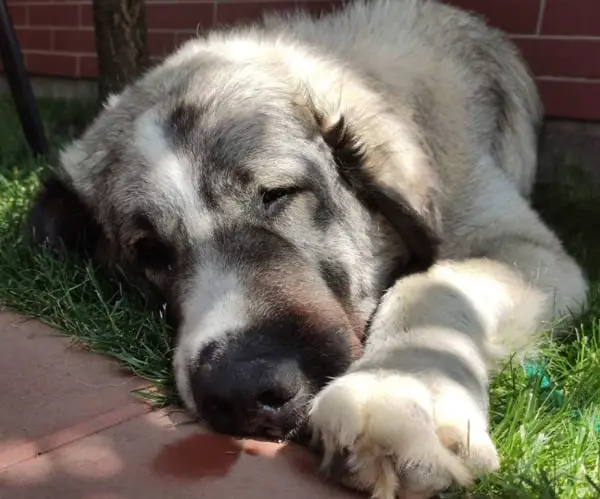
13 Possible Causes of a Dog Breathing Heavy While Sleeping
Dreaming
Dreams are an important part of a dog’s life, just as they are for humans. Dogs may dream about chasing prey, playing with friends, or doing other things that make them happy. When a dog is dreaming, its breathing and heart rate will increase.
Allergies
Many dogs suffer from allergies, and this can cause them to breathe faster than normal when they’re asleep. Allergies can cause a dog’s airways to become inflamed and irritated, which makes it difficult for them to breathe. Some common symptoms of allergies in dogs include sneezing, coughing, fast breathing and difficulty breathing.
Respiratory Issues Because of Breed, Compressed Face Breeds
Dog breeds with compressed face (brachycephalic dog breeds), such as french bulldog and pug, are more prone to respiratory issues that can cause them to breathe faster than normal when they’re asleep. These dog breeds are more likely to suffer from problems such as narrowed airways, collapsed lungs, and overheating.
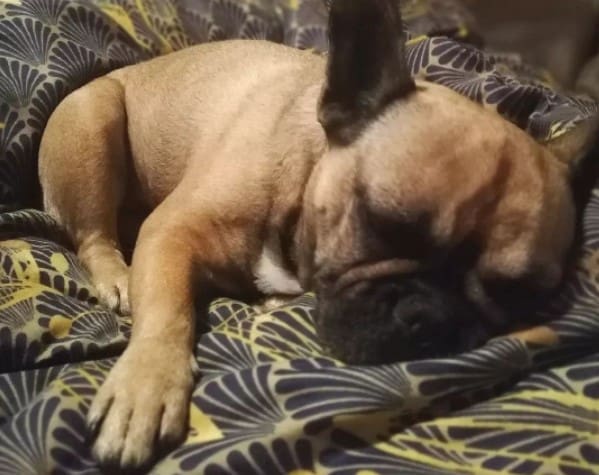
Heat Stroke
If your dog is exhibiting signs of heat stroke, such as rapid breathing, panting, drooling or other signs, it’s important to take action right away. Heat stroke can be deadly, so you need to get your dog cooled down as quickly as possible. Fast breathing allows a sleeping dog to get back to a normal temperature.
Some ways to cool a dog down include spraying them with cold water or giving them ice. It allows water and heat to evaporate from the upper respiratory tract.
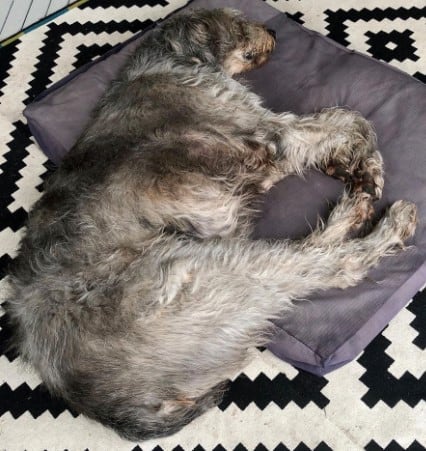
Sleep apnea
A dog with sleep apnea may have a bout of breathing obstruction followed by fast breathing.
Anemia
Anemia is a condition that can cause a dog to breathe heavily while sleeping. Anemia is caused by a lack of red blood cells.
Onion/Garlic Poisoning
Onion and garlic poisoning can cause a dog to breathe heavily while sleeping. These ingredients, which are found in many human foods, can be toxic to dogs. Symptoms of onion and garlic poisoning include vomiting, diarrhea, and fast breathing.
Pregnancy
If you think your dog may be pregnant, it’s important to take her to the veterinarian for a check-up. Pregnant dogs often breathe heavily, and this is usually nothing to worry about. However, if your dog is displaying other symptoms, such as vomiting or diarrhea, it’s best to have her checked out by a vet.
Heart Failure
Dog’s breathing difficulties during sleep can be a sign of heart failure in a furry friend. When the heart is unable to pump blood effectively, fluid can build up in the lungs, causing the dog to breathe rapidly and deeply. Other symptoms of heart failure in dogs include coughing, weakness, respiratory distress and a lack of energy.
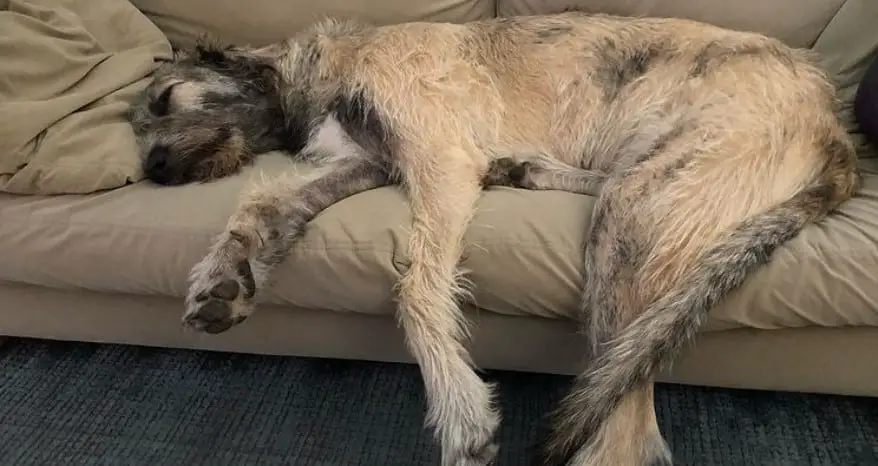
Your Dog is a Puppy
For most new pet owners, it’s not uncommon to find their little one breathing a little heavier than normal when they’re sleeping. This is completely normal, because puppies have a higher metabolism than adult dogs and they need to sleep more to grow and develop properly.
Sleep Cycle Changes
One of the most common reasons for a dog to breathe heavily while sleeping is sleep cycle changes. As dogs get older, their sleep patterns may change and they may start to breathe more heavily, rapid eye movement and even soft little whimpers during certain stages of sleep (REM sleep). Sleep cycle changes from REM sleep to light sleep every 20 minutes so that you might notice changes in their breathing.
Respiratory Infection
Respiratory infections are a common cause of heavy breathing in dogs. These infections can be caused by a variety of different viruses or bacteria.
Old Age
Many older dogs will experience changes in their sleep patterns, including heavier breathing. This is due to the fact that as dogs age, they may start to experience problems with their respiratory system.
What Is a Normal Breathing Rate for a Dog?
A dog’s normal breathing rate will vary depending on a number of factors, including age, breed and health. In general, a healthy dog should breathe between 20 and 30 times per minute. If your dog is panting, their breathing rate will be much higher than this.
When To Be Concerned About Your Dog’s Heavy Breathing
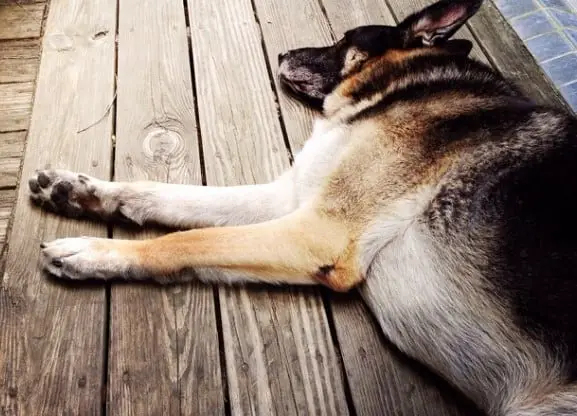
Your Dog is Displaying Pale or Dog’s Gums are Blue While Breathing Heavy
If your dog has blue gums and is breathing heavily, it’s a sign that they’re not getting enough oxygen. It can be a red flag for a number of serious health issues.
Your Dog is Breathing Heavy and Has a Rapid Heart Rate
If your dog is breathing heavily and has a rapid heart rate, it could be a sign of pulmonary edema. This is a condition in which fluid builds up in the lungs and makes it difficult for the dog to breathe.
Your Dog is Panting With a Closed or Partially Open Mouth
Dogs pant to cool down, so if your dog is panting with a closed or partially open mouth, it’s likely because they’re overheated. Pet owners must urgently lower the body temperature of the dog.
Your Dog is Making Other Noises While Breathing Heavy
There are a number of reasons why your dog may be making other noises while breathing heavily, some of which are more serious than others. If your dog is congested, it means that their airways are blocked.Your pet may make one or more of the following noises if they are having trouble breathing: snorting, wheezing, or retching. These are common symptoms associated with other respiratory conditions like chronic bronchitis.
What Should I Do If My Dog Is Breathing Fast While Sleeping?
For an accurate diagnosis of your pet’s condition, please make an appointment with your vet.
At Home Breathing Test
Count your dog’s respiratory rate while he or she is sleeping or resting. This may be determined by tracking the rise and fall of their rib cage over a minute. The healthy respiratory rate for a dog is 30 breaths per minute. Anything exceeding 30 breaths per minute is usually cause for concern.
Put Them on a Diet
A poor diet may result in a variety of undesirable symptoms, including breathing difficulties. A basic, veterinarian-approved diet could help your four-legged companion lose weight and breathe a bit more easily.
When Should I Contact My Vet Immediately About My Dog’s Breathing?
If your dog’s breathing is fast while at rest or sleeping, they might be suffering from respiratory distress. If you notice any of the following symptoms, seek medical attention right away:
- Notably labored breathing was evident (engaging stomach muscles to assist in respiration)
- Pale, blue-tinged or brick red gums
- Reluctance to drink, eat or move
- Open-mouthed breathing while at rest
- Out of character drooling
- Breathing that is deep, noisy, or has a different timbre than regular panting
How Will The Vet Diagnose The Cause of My Dog’s Rapid Breathing?
Most of the time, when a dog is having problems breathing, it’s due to an infection or obstruction in the airways. It may also be associated with problems in the heart, circulatory system.
Your vet may prescribe pain relief, oxygen therapy, intravenous fluids, or medication. In order to determine the cause of your dog’s rapid breathing, your veterinarian will likely perform a number of diagnostic tests, including a full physical examination, x-rays (to check lung tumors), and blood work. If your dog has stress, anxiety, or other psychological factors, specialized training with a certified dog behaviorist may be required.
How Do I Tell if My Dog is in Pain?
If your dog is in pain they may:
- Show signs of agitation.
- Cry out, yelp or growl.
- Be sensitive to touch or resent normal handling.
- Become grumpy and snap at you.
- Dog breathe experiencing respiratory distress
- Extreme fatigue.
- Limp or be reluctant to walk.
- Stuffy nose
- Become depressed and stop eating.
- Have rapid, noticeably labored breathing and an increased heart rate.
FAQ
How Long Should Your Dog Be Sleeping Each Day?
Most dogs need around 14-16 hours of sleep per day. Puppies and young dogs may need up to 18 hours.
What Can Help My Dog Sleep?
There are a few things you can do to make sure your dog gets a good night’s sleep. First, create a comfortable sleeping environment by making sure their bed is soft and cozy. You can also help them relax by playing calming music before bedtime. And lastly, stick to a routine so they know when it’s time to sleep.
Does heavy breathing mean a dog is dying?
That being said, there are a few things to look for that might suggest your elderly dog is nearing death or has already died. The following are the most common symptoms you’ll notice: agitation, difficulty breathing, and restlessness are one of them.
If Your Dog Breathes Fast While Sleeping, Should You Wake Them Up?
While it is always best to consult with a veterinarian, in most cases if your dog is breathing rapidly while sleeping, there is no need to wake them up. This could be an indication of a respiratory issue such as asthma, bronchitis, or pneumonia, which will require treatment from a professional.
Conclusion
During rest, breathing rapidly is not uncommon in puppies, but it’s something to keep an eye on in your adult dog. Keep their diet consistent and provide them with a relaxing place to unwind! These things, as well as regular veterinary visits, will assist you in keeping your furry friend happy and healthy.
Note: This post’s content is intended to be informative and is not constitute medical advice for pets.

